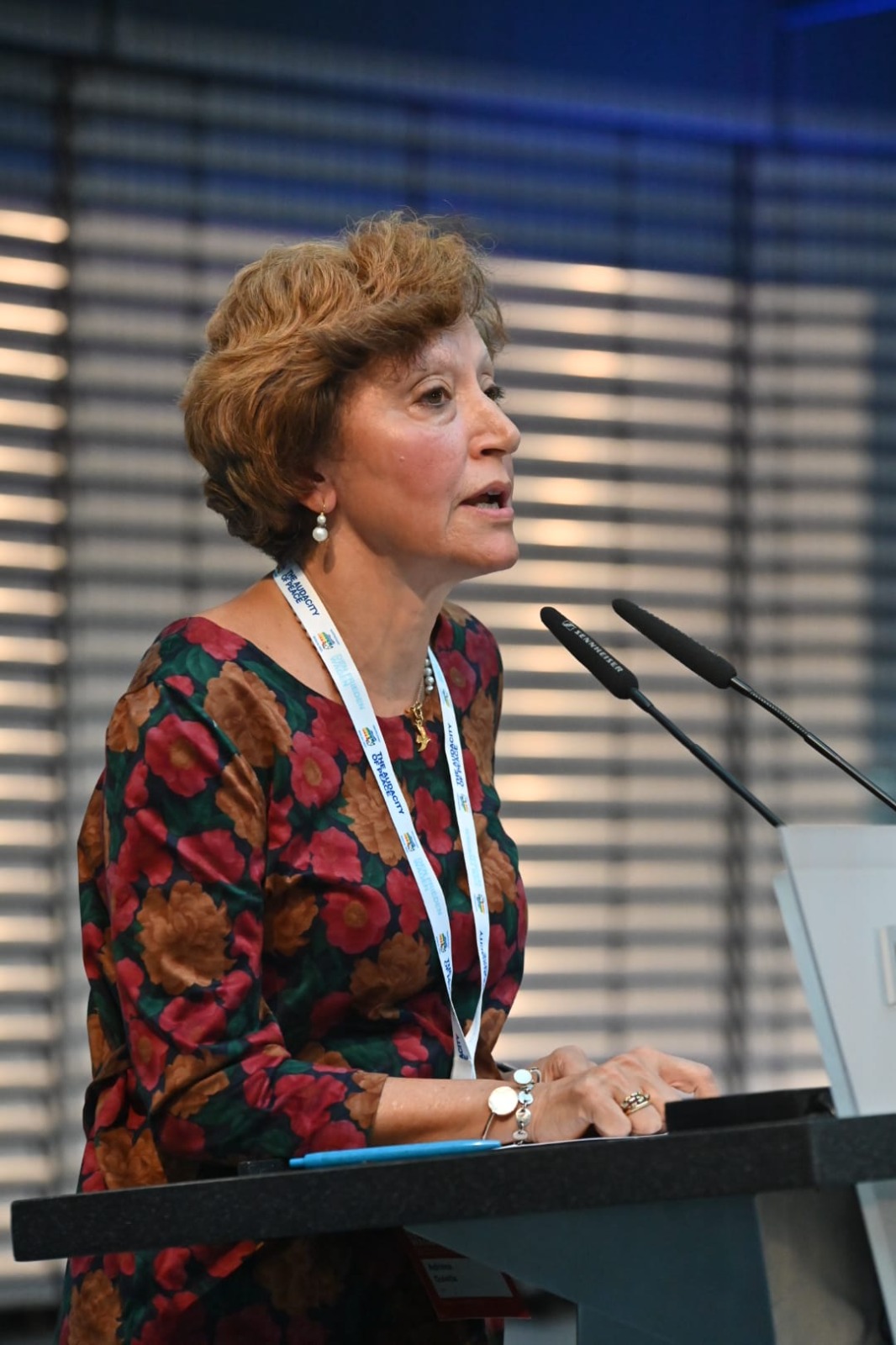
The year 2019 marked the 30th anniversary of the ratification of Convention on the Rights of the Child. It is the first statement on the rights that must be recognised and guaranteed to all children in the world. In 1989 all nations, with the exception of the United States, signed the 54 articles for the protection of children, recognising their social, political, cultural and economic rights for the first time.
That is why it is necessary to increasingly promote awareness of the Convention - and this panel serves the purpose - and to work to ensure that Countries implement it effectively. The Convention calls on Signatory State Parties to commit themselves to protecting “each child within their jurisdiction without discrimination of any kind, irrespective of the child's or his or her parent's or legal guardian's race, colour, sex, language, religion, political or other opinion, national, ethnic or social origin, property, disability, birth or other status … or other status” (art. 2). In addition, it calls for states to take “all appropriate measures to ensure that the child is protected against all forms of discrimination or punishment on the basis of the status, activities, expressed opinions, or beliefs of the child's parents, legal guardians, or family members”.
Effective protection is better clarified in article 7. And today I would like to focus on what Article 7 establishes: the first of rights and the most basic of them. It is the right to a name, that is, to a legally recognised identity. Article 7 states: “the child shall be registered immediately after birth and shall have the right from birth to a name, the right to acquire a nationality and. as far as possible, the right to know and be cared for by his or her parents”. But out of 125 million children born each year worldwide, 51 million (more than 40%) are not registered at birth. About 70% of the world's population lives in countries with incomplete or insufficient birth registration systems. 230 million children under the age of five are not registered (35%). In sub-Saharan Africa they are 85 million and in South Asia 103 million.
Part of these children grow up but remain 'invisible': they do not exist, they do not count, they are not part of the population of states. Children who cannot be enrolled in school, nor access public services. If they disappear, they cannot be claimed by their parents. There is no birth certificate, no registration certificate, nor any other document that can prove their existence. As non-citizens they are condemned to illegality: stowaways in their own country.
Civil registration, in fact, means not only having a birth certificate, but having a name to which a legal identity corresponds, i.e. being recognised as a citizen by one's state. It is an indispensable step to enjoy fundamental rights such as education, health care and much more. Without such recognition, when adults they will not be able to be employed regularly, have a driving licence, travel legally, inherit, marry, vote and be elected. They will be people with no rights. Thus, they will be exposed to all kinds of abuse: from trafficking, slavery, kidnapping, organ trafficking, prostitution, early marriage, forced labour, enrolment in criminal gangs or irregular armies.
Legal empowerment is vital for the life of children - a right that is still mentioned too little - it is something that particularly touches the poorest sections of populations and involves entire communities: in the Asian slums, in the shantytowns of big African cities, in refugee camps, in Latin American indigenous communities, even in Europe... This is why the Communities of Sant'Egidio in so many countries of the world are committed to restoring this right, which is the fundamental prerequisite for exercising all the others.
It is a battle that Sant'Egidio conducts on a field -that of birth and civil registration- that in our western countries may seem a given, acquired fact, while in many nations it is still to be achieved, and is decisive for any society that intends to be democratic.
To be born is not enough to become a citizen of your country. Being born is not enough is the title of a book that reports on the many difficulties and successes of this undertaking by the Community of Sant'Egidio. Published in Italian and Portuguese, it will also be released soon in English, Spanish and German.
Civil status registration is not a technicality, but an indispensable action, one of the fundamental duties of a state. Its absence creates social imbalances of great proportions. Indeed, if the official "nonexistence" of millions of people opens the door to lawlessness, at the same time it is the very structure of the state that is undermined when entire sectors of the population cannot exercise the right to vote. How to speak of a nation-state if one does not recognize one's own citizens? How can the development of a society be guaranteed if entire sections of the population cannot complete their studies, access higher education, create a professional career for themselves, but remain in the limbo of "non-persons," fated to be a labor force reminiscent of the "serfs" of the European Middle Ages, masses of rightless people destined for a subsistence economy only?
Sant'Egidio has been advocating and working for many years for children's right to legal existence with a program named after the acronym Bravo! (Birth Registration for All Versus Oblivion), to make them visible, co-operating with the local authorities to facilitate civil registration. This effort stems from a profound conviction: all children have the right to a name and an identity – a life deprived of basic rights cannot be acceptable.
The Bravo! program, which is free of charge for users and is supported by institutions or countries sensitive to the issue such as the Principality of Monaco, aims to promote the implementation of an effective civil status system through a series of actions. There is the grassroots action, with the creation of "outreach" spaces to bring institutions closer to the people and carry out "last mile" registrations all the way to remote villages, maternity hospitals, and even schools to prevent children from dropping out from education.
Then there is cultural promotion and awareness-raising among families about the importance of legal empowerment, to prevent the risks of trafficking, disappearances, and more generally the exploitation of the youngest children. To do all this, however, one must also be familiar with the diverse realities: from the rural villages of Malawi, to the bush of Burkina Faso, or the Mozambican countryside.
There is also advocacy at the State level to work with administrations to design strategies and solutions, implement affirmative action, overcome critical issues, and improve regulations and procedures.
When you visit refugee camps in Africa, Asia or elsewhere, you can testify that many of the refugees are undocumented, not only because they hastily fled, but also because they were previously undocumented in their own countries, of which they never became fully-fledged citizens. UNICEF estimates that by the end of 2022, a record number of 43.3 million children were in forced displacement, many of them for their entire lives. The number of displaced girls and boys forced to leave their homes has doubled in the past decade. Thus, the number of "invisibles" is also growing.
By advocating for economically sustainable solutions, based on field knowledge, the Bravo! program sets in motion a process of forming a genuine civil society composed of people, possessors of rights.
With patience and creativity (as in the case of the mobile theater plays to raise awareness in the villages, or that of the storytellers who announce in advance with songs and dances that the "certificate handover party" will take place in this or that village), with dialogue skills vis-à-vis institutions, with simple and practicable solutions (such as placing a registration agent in maternity hospitals or offering the possibility of registration in schools) millions of children have been registered in a relatively short time. More than 5 million people thanks to the Bravo! program have become citizens of States, poor in economic terms but richer of the most important resource: people. It is the beginning of a virtuous process that puts the person, even the most fragile, at the very center and makes people discover the rights and duties of belonging to a nation, while at the same time communicating a sense of the state and the common good. Many men and women -after being enrolled- have found themselves no longer forced to resort to subterfuge or bribes for something that is actually their right to achieve. It is an important step in the battle against corruption that also begins in this way, from the grassroots, with a simple step: being enrolled in civil status as a first stage toward the full enjoyment of other rights. Awareness of one's status as a citizen is also raised.
In suburban areas, thousands of people lining up for their certificates also confirm a great desire for democratic participation. Having a legal identity recognized by the state means feeling part of a national community - an important step for marginalized populations. People finds themselves empowered by being "on the books", people begin to feel that one's life may not be unrelated to the affairs of the nation. People also understand the value of shared rules. The nightmare of a second-class existence is over.
It is ultimately a service to democracy and stability in countries that are often shaken by guerrilla warfare or insurgency - much of it by the very youth - or violence or acts of terrorism. I am thinking of Burkina Faso or Mozambique where guerrilla groups composed by young jihadists are holding captive entire regions. Frustrated by the absence of prospects, left at the margins, these young people risk becoming manpower for crimes of all kinds. Making them citizens-we are discovering this more and more every day-is ultimately a contribution for peace and stability of an entire country.
It can all start with a simple act -simple as civil registration- simple but very important contribution to the making of a new African civil society.
Nelson Mandela, impressively victorious in the battle against apartheid in South Africa, used to say: "You can begin to change the world and make it a better place; no matter how small your actions. A small gesture can change the world".
I believe that this small, great, gesture-the registration of a child -can indeed change our world for the better, contributing to a future of participation and democracy for millions of people.
